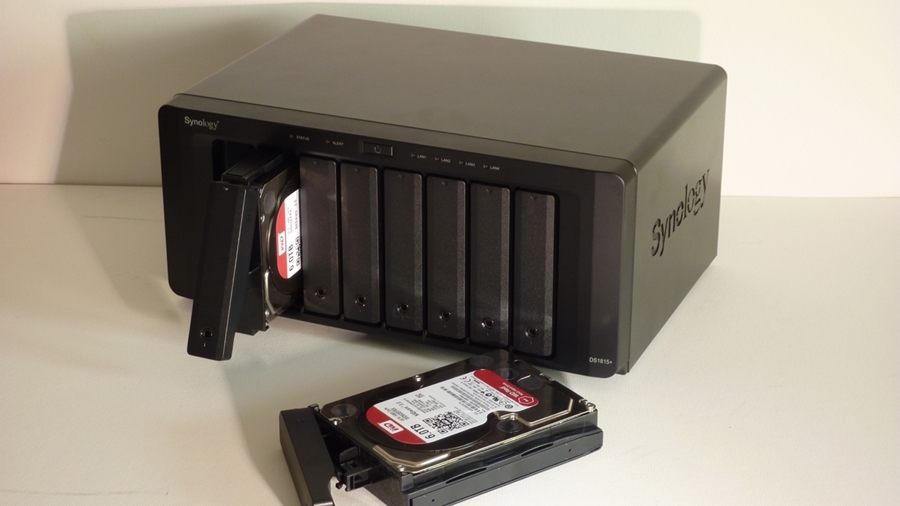Why you can trust TechRadar
I filled the DS1815+ with eight WD Red 6TB hard disks, set up to use Synology Hybrid RAID. The build process finished in around 30 minutes, and after the software was updated I was ready to see what speeds I could get from it.
Early on I ran into what I consider to be a major performance issue, which applies to many NAS devices with multiple gigabit ethernet ports. Although the DS1815+ allows its four gigabit ethernet ports to be bonded together and used as a single connection, in order to get four times the usual gigabit speed when performing a single file transfer, your network switch must support both 802.3ad link aggregation and LACP, or dynamic link aggregation. Most modern managed switches support 802.3ad, but not all support LACP, as I discovered.
When the DS1815+ is first powered on, each port is assigned a separate IP address. When they're bonded together in the DiskStation Manager software, the unit only needs a single address, but you'll only get standard gigabit speeds via any single transfer. There's still a performance advantage though, because with up to four clients transferring files at the same time, the DS1815+ can provide a full 1Gbit/sec to each client.
For the full 4Gbit/sec speed from a single transfer, you'll need to adjust the configuration of your switch to bond those ports together into a LAG group. Unmanaged cheap desktop switches don't even have any configuration software, so you'll need to look at a managed switch. While common in small business environments, they're hardly an essential home networking purchase, and this feature isn't exactly common on routers either.
The first two switches I tried supported 802.3ad, but not LACP. When the ports were bonded together in the switch software, the DS1815+ reported in red text that it "could not enable 802.3ad link aggregation". It then dropped off the network and was inaccessible. It was only when I borrowed a more high-end HP ProCurve switch that I could get the DS1815+ working at full speed.
And obviously, with four ethernet ports, you'll need four cables, along with four network cards in your client PC, with another four cables connecting the PC to the switch, for a total of eight. Savvy network admins use colour-coded cabling for troubleshooting, perhaps using one colour for cabling from the NAS and another for cabling to the NAS.
Another aspect of full-speed use to consider is software. Bonding connections together in Windows isn't straightforward. The only modern operating system that allows you to do so natively is Windows Server 2012, which might be overkill for a home setup. Otherwise, you'll need to use cards that support link aggregation in the drivers.
This limitation isn't a total show-stopping issue. When used in a business environment with many clients, providing a good speed to multiple users is more useful than a single user gobbling up all the bandwidth, but these extra hardware requirements are worth bearing in mind.
I tested the capabilities of the DS1815+ using Intel's NAS performance toolkit and a standard Windows file transfer of 5GB folders of both large and small files. I could only test the full speed using a file transfer though, since my time with the HP ProCurve switch was limited.
At standard gigabit speeds, the DS1815+ is a leap ahead of its predecessor, and shows excellent performance in small file transfers, particularly in tests that put strain on the CPU.
Synology DS1815+ Results (single port)
Intel NAS Performance Toolkit:
- HD Video Playback91.4 MB/s
- 2x HD Playback98.7 MB/s
- 4x HD Playback99.6 MB/s
- HD Video Record108.3 MB/s
- HD Playback and Record101 MB/s
- Content Creation11.7 MB/s
- Office Productivity66.3 MB/s
- File copy to NAS116.1 MB/s
- File copy from NAS85.7 MB/s
- Dir copy to NAS23.6 MB/s
- Dir copy from NAS28.3 MB/s
- Photo Album12.1 MB/s
Synology DS1815+ Results (four ports):
- Small File Read148 MB/s
- Small File Write98 MB/s
- Large File Read398 MB/s
- Large File Write423 MB/s
Compared with other NAS units I've tested, these are good results. Of particular note are some of the individual tests within Intel's NAS performance toolkit, which rely on CPU performance, with 50-100 per cent better performance than NAS models with single or dual-core CPUs.
Crucially, the DS1815+ is significantly faster than the quoted figures for the DS1813+ (which I haven't tested under identical conditions).
